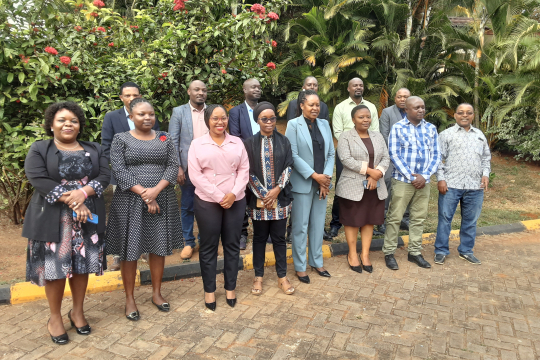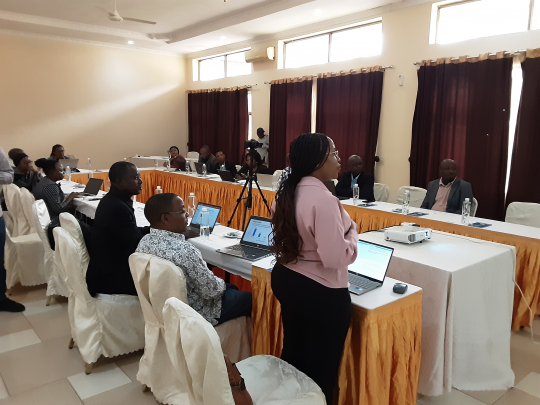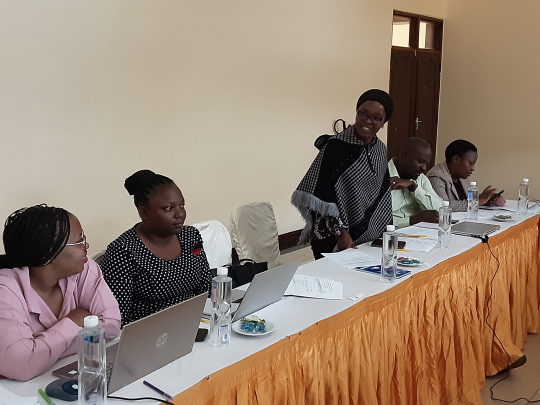The Environment for Development Tanzania (EfDT) organized a half-day national Inclusive Green Economy (IGE) workshop on July 31, bringing together senior research fellows, IGE alumni, and stakeholders in the energy sector. The workshop aimed to foster networking, and dialogue on transformation initiatives, and celebrate the graduation of the 2023 IGE Fellows.
Aloyce Hepelwa, EfD Research Fellow and IGE Lead in Tanzania welcomed IGE alumni from 2021, 2022, and 2023. He emphasized the importance of creating a robust IGE network that connects fellows, researchers, policy practitioners, and relevant stakeholders. The workshop provided a platform for sharing knowledge and experiences related to inclusive green economy issues, particularly focusing on initiatives to implement clean cooking technologies in Tanzania. In his presentation on energy transition and policy perspectives, emphasized on the need for countries to undertake energy reforms that will enable attainment of energy transition as part of the global efforts towards realizing SGD 7 sustainable energy transition targets. He noted that this could be achieved with the help of the energy transition index (ETI) that enables a better understanding of the past and present states of energy transition around the world, leading to more informed energy transition policies and investment decisions
Wilhem Ngasamiaku (IGE Policy Specialist in Tanzania) said that the main task for the IGE Fellows 2023 was to review sector policies, plans, and strategies, identifying existing policy instruments. They noted that over 90% of Tanzanian households rely on biomass, such as firewood or charcoal, for cooking. This dependency poses significant health, environmental, and socio-economic challenges, making clean cooking a priority in the country’s energy policies and strategies.
Mary Mahumi, from the Ministry of Natural Resources and Tourism (Tanzania Forest Services – TFS) representing the 2023 IGE Fellows, presented their finding and highlighted the need for the government to accelerate the transition to modern, affordable clean cooking technologies to mitigate health and environmental impacts. She emphasized that the United Republic of Tanzania recognizes clean cooking energy as a crucial tool in addressing these challenges.
Mary Mahumi presented key policies, plans, and strategies in Tanzania that targeted the achievement of clean cooking. These include the National Energy Policy (NEP) 2015, which promotes the use of clean and efficient cooking technologies. Policy instruments include incentives for improved cookstoves, promotion of alternative fuels such as LPG, biogas, and ethanol, and public awareness campaigns on the benefits of clean cooking. Other notable policies include the Sustainable Energy for All (SE4ALL) Action Agenda, the Tanzania Development Vision 2025, and the Clean Cooking Action Plan, each aiming to enhance energy security and promote sustainable development.
She further highlighted the National Clean Cooking Strategy 2024-2034, which aims to ensure that 80% of Tanzanians use clean cooking solutions by 2034. This strategy outlines implementation methods, targets, outcome indicators, and stakeholder roles, focusing on making clean, safe, affordable, sustainable, and reliable cooking energy accessible.
She also mentioned the fiscal policy instruments, such as the exemption of Value Added Tax on inputs for local gas cylinder manufacturing and the importation of CNG plants and equipment. These measures aim to reduce the cost of clean cooking technologies.
She referred to directives from the President of Tanzania Samia Hassan Suluhu at the National Clean Cooking Energy Strategy conference, which instructed the formation of a national clean cooking task force. This task force, comprising government, private sector, development partners, and academia members, will develop a ten-year strategy to ensure at least 80% clean cooking energy usage in Tanzania by 2032.
Shukurani Rugaimukamu IGE fellow 2023, from the Ministry of Energy highlighted the challenges and opportunities in advancing clean cooking initiatives. Challenges include the high initial cost of clean cookstoves and alternative fuels, limited awareness and cultural resistance to new technologies, and inadequate infrastructure for LPG and other clean fuels in rural areas. Opportunities include a growing market for clean cooking solutions, international funding and support, and potential for local manufacturing and job creation.
Maria Omary IGE Fellow of 2021 and Kamwesige Mutembei, IGE Fellow 2022 recommended establishing a strong network among IGE alumni and fellows to continue sharing experiences and findings. Maria Omary said that the organized workshops, conferences, and dialogues are the places where policymakers can have dialogue on Inclusive Green Economy, issues, and environmental and economic matters. These interactions provide opportunities to share insights and collaborate on solutions. The research fellows can also have a chance to present research findings that demonstrate the impact of green policies on productivity, and clean technologies.
The 2023 IGE Fellows concluded that Tanzania’s commitment to promoting clean cooking is reflected in various policies, plans, and strategies aimed at reducing reliance on traditional biomass and promoting cleaner, more efficient technologies. They recommended that the government should embrace formulating and implementing economic policy instruments that will address the persistent high initial cost of clean coking technologies and alternative fuels; Limited awareness and cultural resistance to new cooking technologies; and inadequate infrastructure for LPG and other clean fuels in rural areas will be crucial to achieving widespread adoption of clean cooking solutions.
By Salvatory
Link to the media GHARAMA KUBWA , MAZOEA YAKWAMISHA MATUMIZI YA NISHATI SAFI (youtube.com)
More link https://www.instagram.com/reel/C8Kds7jC00B/?igsh=aml5cTJrMHkyN2hz


